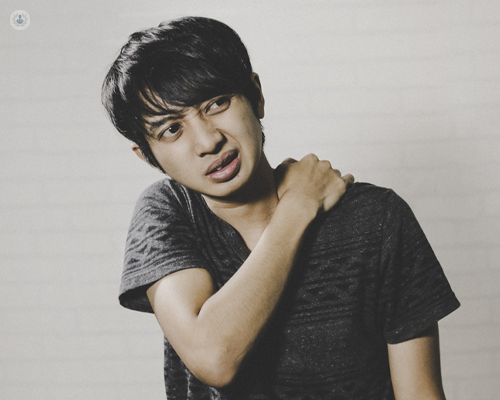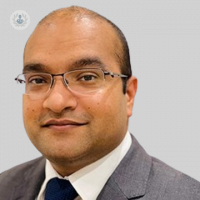When is surgery required for a rotator cuff injury?
Written in association with:Rotator cuff injuries are common shoulder problems that can range from mild inflammation to severe tears requiring surgical intervention. Leading consultant orthopaedic surgeon specialising in shoulder, elbow, and upper limb conditions Mr Ankit Desai aims to provide insight into when surgery becomes necessary for a rotator cuff injury.

What is a rotator cuff injury, and what causes it?
The rotator cuff is a group of muscles and tendons that surround the shoulder joint, providing stability and enabling movement. Injuries to the rotator cuff can occur due to acute trauma, such as a fall or lifting heavy objects, or as a result of chronic wear and tear over time.
How do you know if you have a rotator cuff injury that requires surgery?
Symptoms
Common symptoms of a rotator cuff injury include:
- Pain, especially when lifting or lowering the arm
- Weakness in the shoulder
- Difficulty reaching overhead or behind the back
- Clicking or popping sensations in the shoulder
Diagnosis
If you experience persistent shoulder pain or have difficulty performing daily activities, it is essential to consult with an orthopaedic specialist for an accurate diagnosis. Diagnosis typically involves a comprehensive physical examination, imaging studies such as X-rays and MRI scans, and sometimes, diagnostic injections to confirm the diagnosis and identify the extent of the injury.
What are the treatment options for a rotator cuff injury?
Non-surgical treatment
Initial treatment for a rotator cuff injury often involves non-surgical approaches, such as rest, activity modification, physical therapy and anti-inflammatory medications. These conservative measures aim to alleviate symptoms and improve shoulder function.
Surgical intervention
Surgery may be recommended for individuals who do not respond to conservative treatments or have severe rotator cuff tears that significantly impair shoulder function. Surgical options include:
Arthroscopic repair
This minimally invasive procedure involves using small incisions and a camera to repair the torn tendon using sutures and anchors.
Open repair
In some cases, particularly for large or complex tears, open surgery may be necessary to access and repair the damaged tendon.
Tendon transfer
In cases of irreparable tears, a tendon transfer procedure may be performed to restore shoulder function by transferring a nearby tendon to replace the damaged rotator cuff tendon.
When is surgery necessary for a rotator cuff injury?
Indications for Surgery
Surgery for a rotator cuff injury may be necessary if:
- The injury causes significant pain and functional limitations that impact daily activities and quality of life.
- Conservative treatments fail to provide relief or improve shoulder function.
- The tear is large, complex, or involves multiple tendons.
- The individual is active and wishes to return to sports or physically demanding activities.
What can patients expect during the recovery process after rotator cuff surgery?
Recovery and rehabilitation
Following rotator cuff surgery, patients can expect a period of immobilisation and gradual rehabilitation under the guidance of a physiotherapist. Recovery timelines vary depending on the extent of the injury, the type of surgery performed, and individual factors such as age and overall health.
Deciding whether to undergo surgery for a rotator cuff injury requires careful consideration of various factors, including the severity of the injury, the individual's lifestyle and goals, and the potential risks and benefits of surgery. By seeking timely medical evaluation and collaborating with an orthopaedic specialist, individuals can make informed decisions to optimise their shoulder health and overall well-being.
If you require surgery for a rotator cuff injury, arrange a consultation with Mr Desai via his Top Doctors profile.


